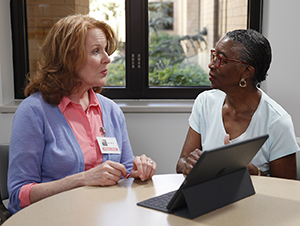A
B
C
D
E
F
G
H
I
J
K
L
M
N
O
P
Q
R
S
T
U
V
W
X
Y
Z
Topic IndexLibrary Index
Click a letter to see a list of conditions beginning with that letter.
Click 'Topic Index' to return to the index for the current topic.
Click 'Library Index' to return to the listing of all topics.
What Is Aphasia?
Aphasia is a loss of language skills that includes understanding or producing language. Aphasia often happens after a stroke. But it can also happen from brain injury, tumors, or neurological disorders. People with aphasia may not be able to express their thoughts (expressive aphasia) or understand others (receptive aphasia).
 |
| A speech therapist may help a person with aphasia regain his or her language skills. |
Signs of aphasia
Signs of aphasia vary with each person. A person with aphasia may show some or all of the signs listed below.
A person with aphasia may not be able to:
-
Understand words when others speak
-
Speak in complete sentences
-
Read or write
-
Understand that numbers have meaning
A person with aphasia may:
-
Speak using only nouns and verbs
-
Mix up the order of words in a sentence
-
Use the wrong words or made-up words
-
Have trouble working with numbers, such as balancing a checkbook
Practical tips for aphasia
A person with aphasia may still think and understand, even if responding is hard. Try to:
-
Ask questions that can be answered with a yes or a no.
-
Speak slowly and clearly in simple sentences. Use simple words, but don’t “talk down” to the person.
-
Give the person time to understand and to respond. Try not to speak for the person unless you must.
Online Medical Reviewer:
Marianne Fraser MSN RN
Online Medical Reviewer:
Stacey Wojcik MBA BSN RN
Online Medical Reviewer:
Sumana Jothi MD
Date Last Reviewed:
7/1/2022
© 2000-2024 The StayWell Company, LLC. All rights reserved. This information is not intended as a substitute for professional medical care. Always follow your healthcare professional's instructions.